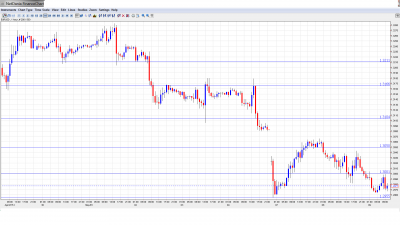The euro dropped below the 1.30 level, as the fallout from the French and Greek elections continue to spook the markets. There are fears that the political instability in Greece and the sharp turn to the left in France may interfere with austerity measures designed to alleviate the Euro-zone debt crisis. The markets received a dose of good news early this morning, as both the German and French Trade Balance readings were slightly better than the market forecast.
Here’s an update on technicals, fundamentals and what’s going on in the markets.
EUR/USD Technicals
- Asian session: EUR/USD dropped to a low of 1.2966, and consolidated slightly higher, at 1.2986. The pair is unchanged in the European session, trading at 1.2980.
- Current range: 1.2945 to 1.30.
- Further levels in both directions: Below: 1.2873, 1.2760, 1.2660 and 1.2623.
- Above: 1.3050, 1.3110, 1.3165, 1.3212, 1.33, 1.34, 1.3437, 1.3486, 1.3550 and 1.3615.
- 1.30 has been breached, and is providing weak resistance to the pair.
- 1.2945 is a weak support level as the pair continues to lose ground.
Euro/Dollar continues to move downward – click on the graph to enlarge.
EUR/USD Fundamentals
- 6:00 German Trade Balance. Exp. 13.4B. Actual 13.7B.
- 6:45 French Trade Balance. Exp. -5.8B. Actual -5.7B.
- 14:00 US Wholesale Inventories. Exp. +0.6%.
- 14:30 US Crude Oil Inventories. Exp. 2.0M.
- 14:45 FOMC Member Pianalto Speaks.
- 17:00 US 10-y Bond Auction.
- For more events later in the week, see the Euro to dollar forecast
EUR/USD Sentiment
- French elections fallout: The markets are bracing for the dramatic shift to the left in France. President-elect Francois Hollande is not considered pro-market, and has already stated that he wants to renegotiate the euro zone fiscal pact in order to stimulate growth in the region, rather than resort to harsh austerity measures. The euro has taken a beating since the election, and there are dire predictions that EUR/USD could eventually plummet to 1.20. The French election promises to mark a significant turn from austerity towards growth, perhaps a European Spring. The euro has now fallen below the 1.30 level, with no end to the currency’s slump in sight.
- Political uncertainty grips Greece: The voters in Greece have demanded change, but the inconclusive election results have left the country in political chaos, and Greece’s ability to stay in the Euro-zone is being questioned. A leader from one of the leftists parties went so far as to state that the country’s commitment to the international rescue deal was null and void. The ECB and Germany are fuming, but they can do little more than plead for Greece to honor the bailout deal.
- Merkel suffers defeat in German elections: The German government was not able to escape the weekend’s political turmoil, as Chancellor Merkel’s center-right coalition lost a key regional election. The results raise questions as to to the stability of Merkel’s government.
- Direction of US economy – anyone?: Mixed data out of the US continues to confound the markets. Consumer Credit jumped to its highest level in over four years, but Consumer Economic Optimism fell. Confusing? With the 2012 election campaign heating up, look for President Obama and Republican contender Romney to criss-cross the country painting very different pictures of the US economy.
- European recession deepening?: Euro-zone releases have generally been weak, and there are clear signs of a serious recession in Q2. For many countries, the recession is not new at all: Spain is the latest member of a growing list of European economies now in recession, joining the ranks of a host of others, including heavyweights Italy and the UK. The euro is dropping against the US dollar, and with a new Socialist government in France and political deadlock in Greece, the currency could continue its slump.
- Trouble in Spain: With the elections in France and Greece, Spain has not been the center of attention in the corridors of Berlin and Brussels. Of course, the serious problems affecting the country will not magically disappear, and Spain has the unenviable role of being the epicenter of the debt crisis. What will the EU do with the Euro-zone’s fourth largest economy? Greece is not a good model, as Spain is considered “too big too bail”. With a staggering unemployment rate of 24%, reform and growth will be no easy task.
- QE3 chances dropping: Ben Bernanke didn’t rule out QE3, but as time passes by, this option seems quite unlikely. A “hands off” policy of low interest rates for the foreseeable future may not make for dramatic moves in market, but it is supportive for the greenback, which is enjoying a good run against the euro.

